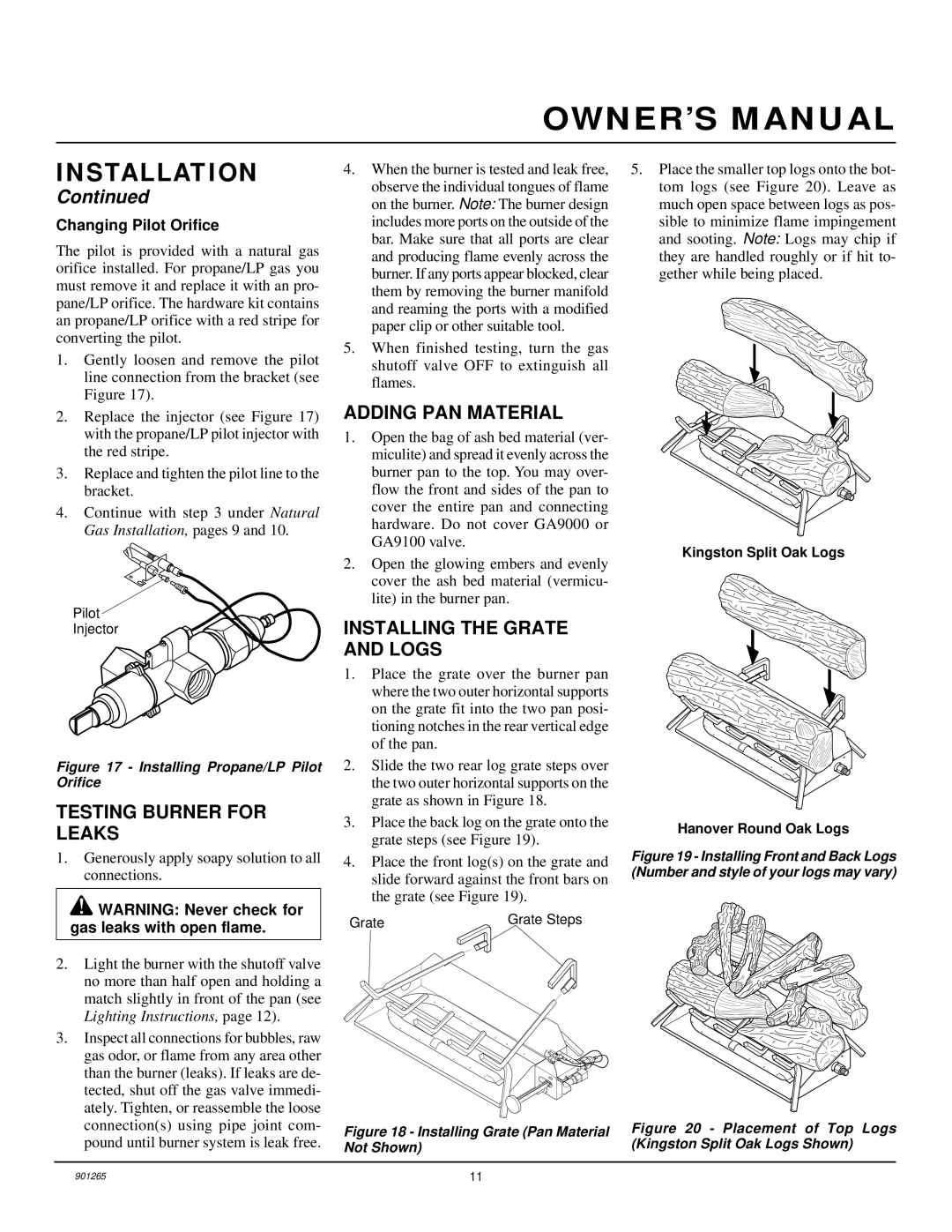
OWNER’S MANUAL
INSTALLATION
Continued
Changing Pilot Orifice
The pilot is provided with a natural gas orifice installed. For propane/LP gas you must remove it and replace it with an pro- pane/LP orifice. The hardware kit contains an propane/LP orifice with a red stripe for converting the pilot.
1.Gently loosen and remove the pilot line connection from the bracket (see Figure 17).
2.Replace the injector (see Figure 17) with the propane/LP pilot injector with the red stripe.
3.Replace and tighten the pilot line to the bracket.
4.Continue with step 3 under Natural Gas Installation, pages 9 and 10.
Pilot
Injector
Figure 17 - Installing Propane/LP Pilot Orifice
TESTING BURNER FOR LEAKS
1.Generously apply soapy solution to all connections.
![]() WARNING: Never check for gas leaks with open flame.
WARNING: Never check for gas leaks with open flame.
2.Light the burner with the shutoff valve no more than half open and holding a match slightly in front of the pan (see Lighting Instructions, page 12).
3.Inspect all connections for bubbles, raw gas odor, or flame from any area other than the burner (leaks). If leaks are de- tected, shut off the gas valve immedi- ately. Tighten, or reassemble the loose connection(s) using pipe joint com- pound until burner system is leak free.
4.When the burner is tested and leak free, observe the individual tongues of flame on the burner. Note: The burner design includes more ports on the outside of the bar. Make sure that all ports are clear and producing flame evenly across the burner. If any ports appear blocked, clear them by removing the burner manifold and reaming the ports with a modified paper clip or other suitable tool.
5.When finished testing, turn the gas shutoff valve OFF to extinguish all flames.
ADDING PAN MATERIAL
1.Open the bag of ash bed material (ver- miculite) and spread it evenly across the burner pan to the top. You may over- flow the front and sides of the pan to cover the entire pan and connecting hardware. Do not cover GA9000 or GA9100 valve.
2.Open the glowing embers and evenly cover the ash bed material (vermicu- lite) in the burner pan.
INSTALLING THE GRATE AND LOGS
1.Place the grate over the burner pan where the two outer horizontal supports on the grate fit into the two pan posi- tioning notches in the rear vertical edge of the pan.
2.Slide the two rear log grate steps over the two outer horizontal supports on the grate as shown in Figure 18.
3.Place the back log on the grate onto the grate steps (see Figure 19).
4.Place the front log(s) on the grate and slide forward against the front bars on the grate (see Figure 19).
Grate | Grate Steps |
Figure 18 - Installing Grate (Pan Material Not Shown)
5.Place the smaller top logs onto the bot- tom logs (see Figure 20). Leave as much open space between logs as pos- sible to minimize flame impingement and sooting. Note: Logs may chip if they are handled roughly or if hit to- gether while being placed.
Kingston Split Oak Logs
Hanover Round Oak Logs
Figure 19 - Installing Front and Back Logs (Number and style of your logs may vary)
Figure 20 - Placement of Top Logs (Kingston Split Oak Logs Shown)
901265 | 11 |
